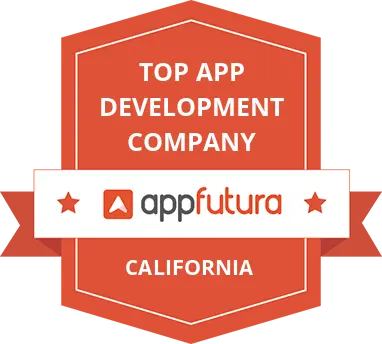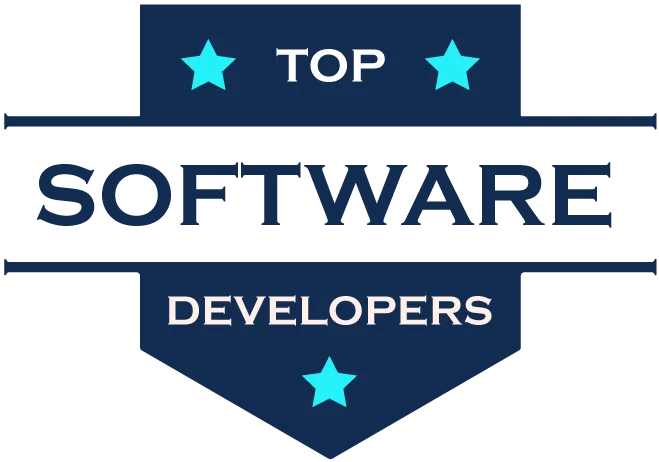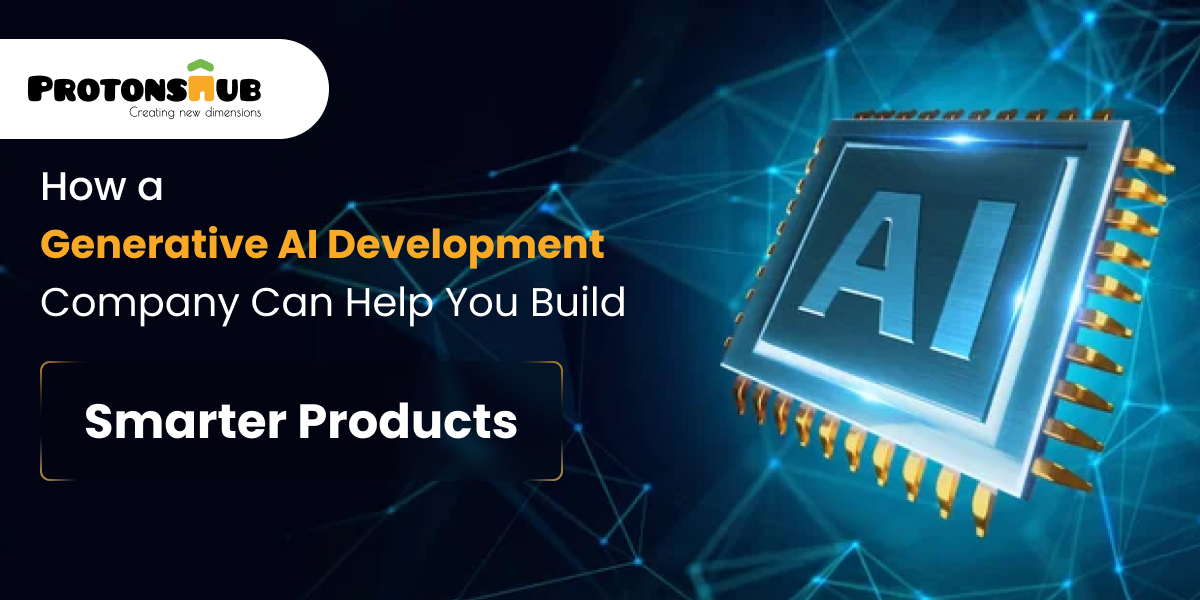In today’s hyper-digital era, the success of a product is no longer defined solely by its functionality. Instead, it hinges on intelligence—its ability to learn, adapt, personalize, and engage. As customer expectations evolve and market competition intensifies, organizations must reimagine how they design and deliver experiences. This is where Generative AI enters the equation.
Generative AI represents a paradigm shift in how digital products are built and scaled. From automated content creation to dynamic personalization and intelligent automation, Generative AI is empowering businesses to develop products that think, communicate, and respond like humans. But harnessing the full potential of this transformative technology requires more than off-the-shelf solutions—it calls for deep technical expertise, domain understanding, and strategic implementation.
At Protonshub Technologies, we help organizations accelerate innovation by integrating Generative AI capabilities directly into their product architecture. This blog explores how a Generative AI development company plays a crucial role in building smarter products—from development services to tools and performance metrics that truly measure success.
Understanding Generative AI in Product Development
Generative AI refers to a class of artificial intelligence that uses machine learning—particularly deep learning and neural networks—to generate new content, solve problems, and simulate human reasoning. Unlike traditional AI models that analyze and react based on predefined rules or datasets, Generative AI can create original outputs such as text, code, images, designs, and more.
Role of Generative AI in Modern Product Design
In product development, Generative AI extends well beyond basic automation. It becomes a collaborative partner in the design and development process—enhancing creativity, reducing time-to-market, and improving decision-making through real-time insights.
Here’s how Generative AI transforms product development:
- Design Efficiency: AI tools assist in generating multiple prototypes, interfaces, and user flows in minutes rather than weeks.
- Dynamic Personalization: Products can adapt content, recommendations, and interfaces to user behavior in real time.
- Conversational Interfaces: AI-powered chatbots and voice assistants create seamless and human-like interaction layers.
- Content Intelligence: From writing product descriptions to summarizing reports, AI automates large-scale content generation.
- Predictive Analytics: AI enables products to proactively address customer needs by anticipating behavior and offering relevant suggestions.
By embedding these capabilities into your products, Generative AI enables organizations to shift from reactive service delivery to proactive value creation.
Key Services Offered by a Generative AI Development Company
A full-service Generative AI development company goes beyond building AI models. It becomes a strategic partner that offers technical, operational, and consultative support to help businesses create intelligent, scalable, and future-ready digital products.
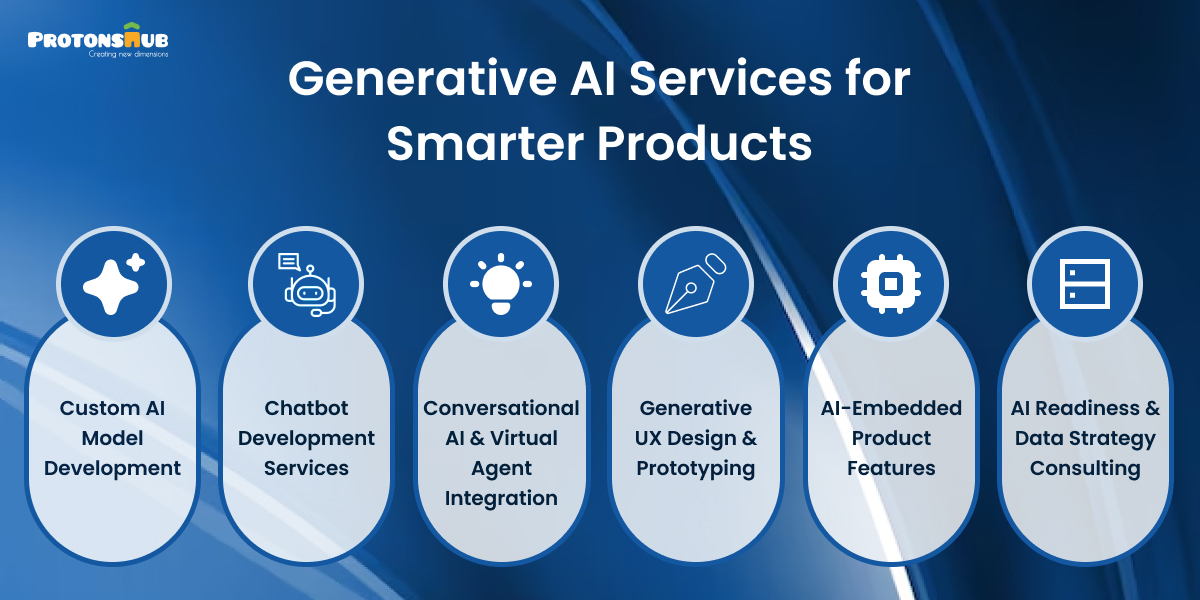
1. Custom AI Model Development
Each business has distinct goals, making a universal AI approach ineffective. That’s why leading development companies offer custom AI model development that aligns with specific business goals and data structures. This includes training or fine-tuning large language models (LLMs), creating multimodal AI systems that understand and generate text, images, or audio, and building domain-specific NLP models for tasks such as document processing, language translation, or customer interaction. Some companies also specialize in developing computer vision and speech recognition pipelines, enabling smarter visual and auditory capabilities in applications. These solutions are designed using your proprietary data to ensure they are accurate, contextually relevant, and optimized for real-world performance.
2. Chatbot Development Services
Conversational interfaces have become a key driver of customer satisfaction and operational efficiency. Generative AI development companies offer comprehensive chatbot development services to deploy intelligent virtual assistants across digital touchpoints. These chatbots can understand multiple languages, retain context across interactions, and even gauge user sentiment to respond more empathetically. By integrating seamlessly with existing CRMs, ERP systems, or helpdesk platforms, they become more than just a chat interface—they serve as fully embedded, intelligent extensions of your brand. Whether you’re looking for custom chatbot development for niche requirements or enterprise-grade bots for complex workflows, the right partner ensures scalability, performance, and user engagement.
3. Conversational AI & Virtual Agent Integration
While chatbots handle basic queries, modern enterprises are adopting more advanced conversational AI systems to support end-to-end user journeys. These virtual agents are capable of conducting multi-step dialogues, accessing backend systems to retrieve information, or even executing commands like processing refunds or scheduling appointments. They are frequently deployed in departments like HR, IT, finance, and healthcare to streamline tasks and reduce workload. For instance, an HR assistant might help employees update personal information or access policy documents, while an IT assistant might handle password resets or report generation. With the right implementation, these agents elevate internal productivity and enhance external user experiences.
4. Generative UX Design and Prototyping
Generative AI is also transforming the way digital experiences are designed. With AI-driven prototyping tools, businesses can create UI/UX mockups, generate wireframes, and build complete user journeys in a fraction of the time traditional methods require. Teams can now prompt AI with design ideas or user goals and receive fully formed interface options ready for iteration. This not only speeds up product experimentation but also empowers teams to test more variations and optimize user flows based on data-driven feedback. Many companies also utilize AI for automated A/B testing, making it easier to identify what design elements resonate most with their users.
5. AI-Embedded Product Features
Generative AI can be directly embedded into software products to create intelligent, context-aware features. These can include smart search bars that understand user intent, automated document creation tools that generate reports or contracts in seconds, and dynamic pricing engines that adapt based on real-time supply and demand. Some products integrate voice-command functionality, enabling hands-free operations, while others deploy emotion-aware algorithms to tailor responses based on tone and sentiment. These capabilities are not only useful in enhancing user satisfaction but also in automating workflows and enabling faster decision-making within the product itself.
6. AI Readiness and Data Strategy Consulting
Any successful AI initiative begins with data. A specialized Generative AI development company plays a critical role in preparing your organization for AI adoption by helping define a solid data foundation. This typically involves designing scalable data pipelines, cleaning and annotating raw data, and establishing centralized data lakes that can support real-time processing and machine learning operations. Just as importantly, these companies help ensure compliance with data privacy regulations and security standards, mitigating risks while enhancing your ability to innovate with confidence. Without the right data strategy, even the most sophisticated AI model will struggle to deliver meaningful results.
Tools & Technologies Used in Generative AI Development
Creating and scaling Generative AI products demands a strong, modern technology stack. A specialized Generative AI development company brings deep experience across tools, platforms, and frameworks that accelerate development and maximize performance.
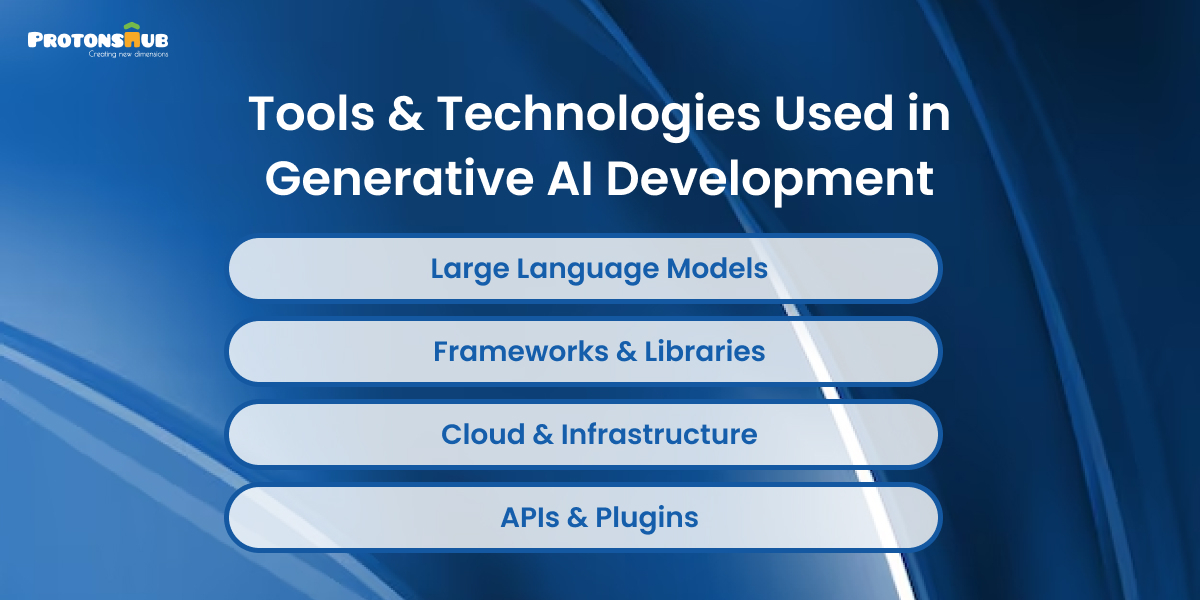
1. Large Language Models (LLMs)
The core of many AI applications today lies in foundation models like:
- OpenAI (GPT-4, GPT-4o) – Utilized for human-like text generation, conversational AI, and automating various tasks.
- Meta LLaMA, Google Gemini, Anthropic Claude, Mistral, Falcon – Each suited to different contexts like multilingual tasks, scientific data generation, or lightweight deployment.
- These models are fine-tuned and customized for specific client use cases, ensuring high accuracy and relevance.
2. Frameworks & Libraries
- TensorFlow and PyTorch – Core frameworks for developing and training deep learning models.
- LangChain and LlamaIndex – Essential for building LLM-powered applications using retrieval-augmented generation (RAG) techniques.
- Hugging Face Transformers – A repository of pre-trained models and tools for rapid AI integration.
- OpenCV and Detectron2 – Used in computer vision projects like image segmentation, object recognition, and facial detection.
3. Cloud & Infrastructure
- AWS SageMaker, Google Vertex AI, Azure ML – Provide scalable environments for training, tuning, and deploying AI models at scale.
- Docker, Kubernetes, Ray – Used for packaging, orchestrating, and running distributed AI workloads reliably.
- Databricks, Snowflake, BigQuery – Powerful tools for processing massive datasets and supporting real-time data pipelines.
4. APIs & Plugins
- Twilio, WhatsApp, Slack – Integrate real-time messaging with chatbots and virtual agents.
- Stripe, Salesforce, Zendesk – Allow AI to interact with payments, sales CRMs, and customer service tools to streamline workflows.
These tools form the technological backbone that empowers Generative AI solutions to be intelligent, responsive, and scalable.
KPIs and Metrics to Measure Generative AI Product Success
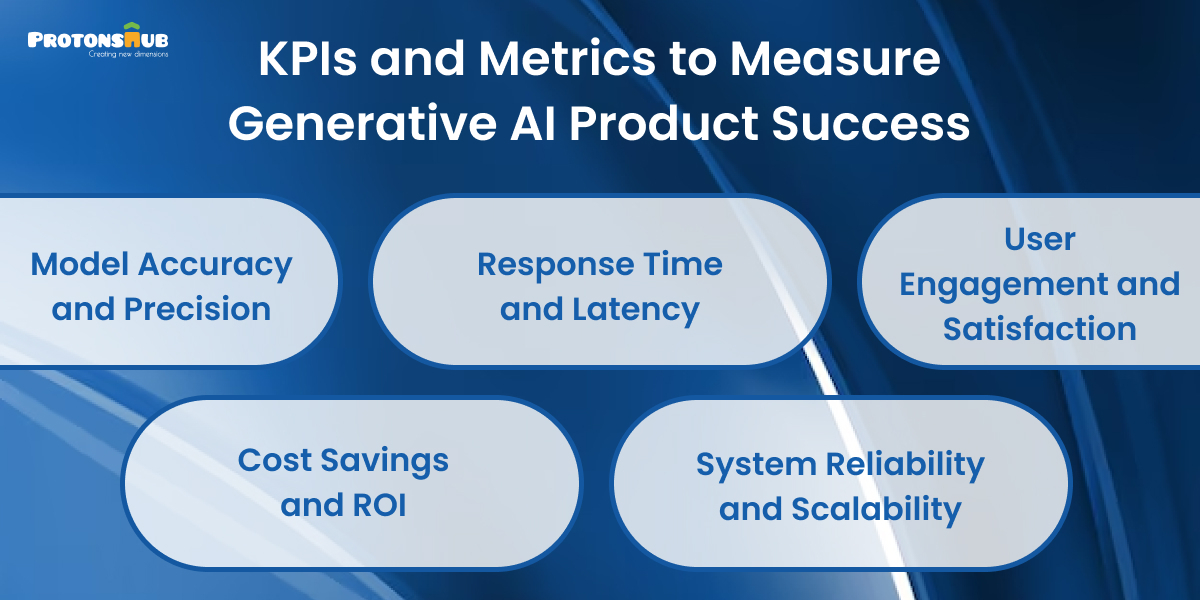
1. Model Accuracy and Precision
One of the most fundamental metrics is the model’s accuracy in delivering relevant, high-quality outputs. Depending on the use case, this might include:
- Prediction accuracy (for recommendation systems)
- Intent recognition (for conversational AI)
- Factual correctness (for text generation)
2. Response Time and Latency
Speed matters, especially in customer-facing applications. Low latency in AI-generated responses ensures smooth interactions, whether in real-time chat or decision automation.
3. User Engagement and Satisfaction
Metrics such as click-through rates (CTR), time spent on task, or Net Promoter Scores (NPS) can reflect how effectively the AI features contribute to overall user experience.
4. Cost Savings and ROI
Evaluating the return on investment (ROI) involves comparing the AI-driven solution against human resource costs or traditional alternatives. A well-implemented Generative AI solution can lead to:
- Reduced customer service staffing costs
- Shorter product development cycles
- Lower churn rates
5. System Reliability and Scalability
Uptime, failure rates, and system resilience under load also matter. Enterprise-grade AI products must be able to scale across large volumes of interactions and data inputs without degradation.
Future Trends in Generative AI Product Development
Generative AI is evolving rapidly, and forward-thinking development companies continuously adapt to leverage new trends. Here's what the future holds:
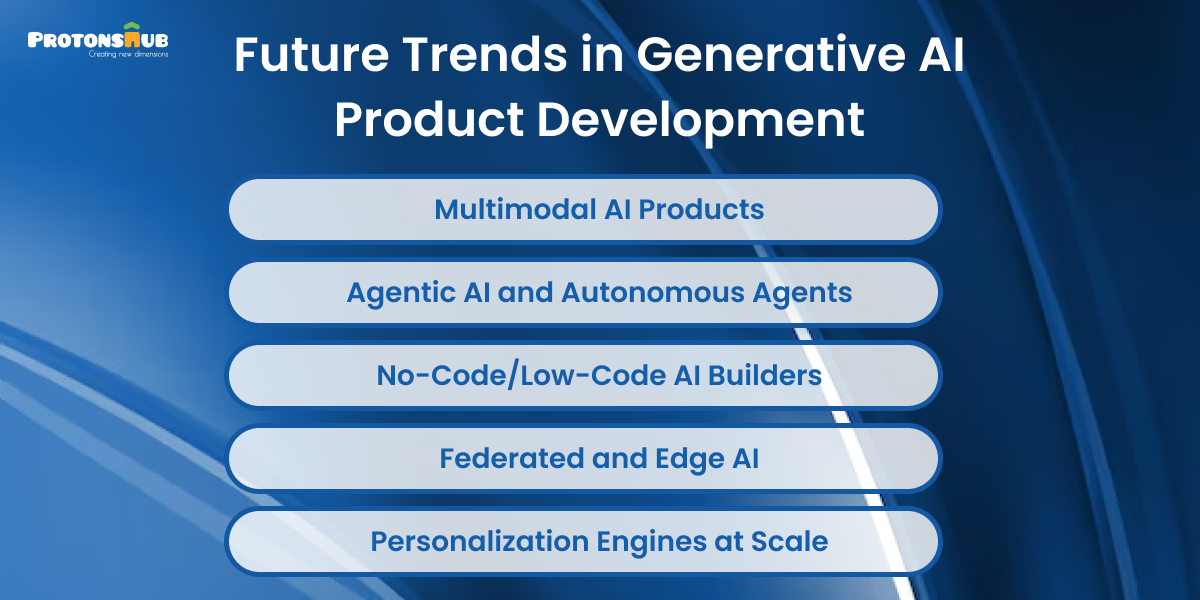
1. Multimodal AI Products
AI solutions will increasingly integrate multiple input types—text, image, audio, video—creating immersive and responsive digital products. For example, AI systems that analyze both customer voice tone and chat transcripts to offer empathetic responses.
2. Agentic AI and Autonomous Agents
Autonomous agents will go beyond task execution to make decisions, manage resources, and self-optimize based on feedback loops. These agents can handle multi-step processes such as onboarding new customers or processing complex transactions without human input.
3. No-Code/Low-Code AI Builders
More businesses will access AI through platforms that allow them to create workflows and models with minimal coding. This democratization will fuel faster experimentation and deployment cycles.
4. Federated and Edge AI
To ensure data privacy and reduce latency, AI models will be deployed closer to the source—on edge devices or in federated settings—allowing localized decision-making without sharing sensitive data.
5. Personalization Engines at Scale
With LLMs capable of understanding granular user behavior, businesses will create hyper-personalized experiences—from marketing emails to dynamic product pages—tailored to individual users in real time.
Security and Ethical Considerations in Generative AI
While the possibilities with Generative AI are vast, so are the responsibilities. Security and ethical compliance are non-negotiable in enterprise-grade AI development.
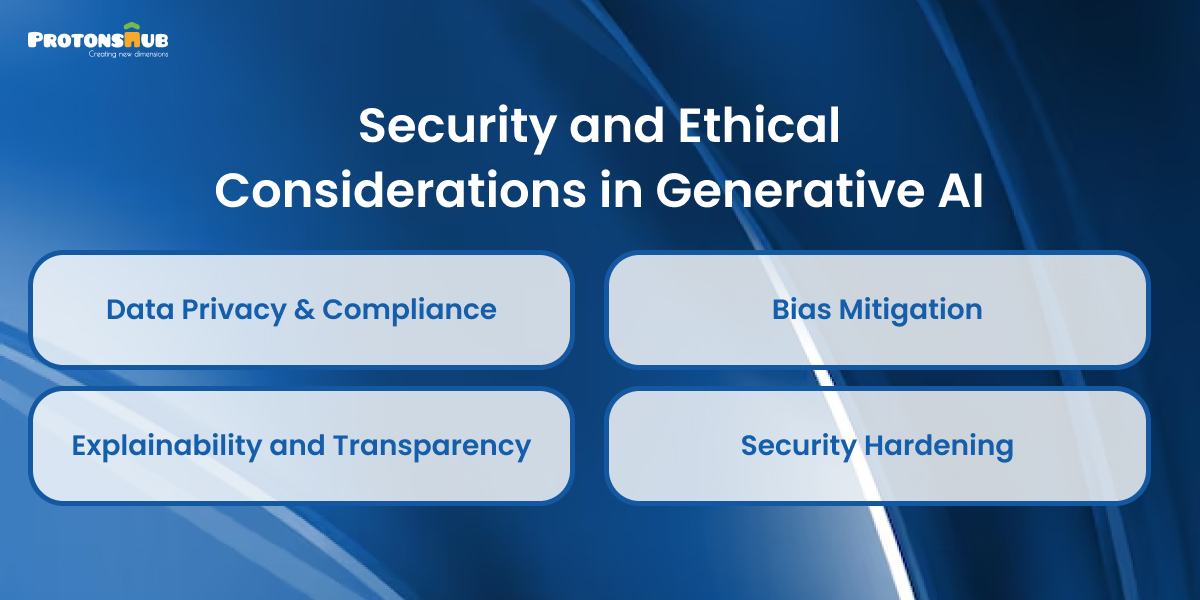
1. Data Privacy and Compliance
A trusted AI development partner ensures adherence to global regulations like GDPR, HIPAA, and CCPA. It focuses on protecting user data and maintaining traceability of AI decisions.
2. Bias Mitigation
Generative models can inadvertently perpetuate biases present in training data. Ethical development emphasizes inclusive datasets, algorithmic fairness, and ongoing human oversight.
3. Explainability and Transparency
Especially in regulated industries like healthcare and finance, AI decisions must be explainable. Development companies integrate explainability frameworks to ensure stakeholders understand how and why a model produced a particular result.
4. Security Hardening
With AI systems becoming part of critical infrastructure, protecting against model exploitation, prompt injection, and adversarial attacks is essential. Techniques like input sanitization, red teaming, and model watermarking help secure the system.
Conclusion
Generative AI has moved from a future vision to a powerful tool driving today’s business innovation. From intelligent interfaces and real-time automation to predictive analytics and personalized experiences, its potential is immense. But tapping into that potential requires a skilled and strategic partner.
Partnering with a Generative AI development company brings access to tailored solutions, enterprise-ready tools, security best practices, and long-term support. Whether your goal is to launch next-gen features or embed intelligence into your core offerings, the right team can turn complex AI innovation into practical business value.
At Protonshub Technologies, we offer end-to-end support across all aspects of Generative AI—from custom AI models and chatbot development services to performance optimization and ethical governance. We don’t just build AI products—we help you build smarter products that grow, evolve, and deliver value at scale













